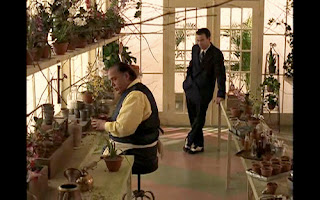One of the many blessings of not having cable or access to broadcast television is that my (rare) viewings are dictated solely by my own tastes. I have recently been watching the Nero Wolfe series with Timothy Hutton as Archie Goodwin and the late Maury Chaykin (1949-2010) as Nero Wolfe and have enjoyed it immensely. AMC’s Nero Wolfe was wonderfully smart, stylish and funny. No wonder it did not last more than two seasons (2001-2002).
A DVD boxed set of the series can be found on Amazon, or, more affordably, on EBay. I was lucky to find mine in a Barnes and Noble sales bin at half price, and could not have spent the money better.
Detective fiction has been a lifetime guilty pleasure, and I have been reading Rex Stout’s Nero Wolfe books with great satisfaction for over 30 years. I’ve always had a rude picture of Archie in my mind – mostly of a hard boiled detective with a fast mouth. However, Hutton has managed to sponge away nearly 30 years of envisioning and replaced the picture in my mind’s eye with himself. I will never be able to see Archie in any other light again.
Chaykin is good as Wolfe (perhaps too emotional and somewhat sloppy for my taste), but Hutton is a revelation. He plays Archie less like a tough guy and more like a 1930s sharpster. He is less Bogart and more Lee Tracey. He’s raffish, rakish and jaunty. He doesn’t walk, he saunters. His hat is cocked and his mouth is smirked. He’s the quintessential New York wiseass between the World Wars – a vanished American everyman who is equal to every occasion. He has smarts, savvy and his eye on the payoff.
Archie, as conceived by Stout, is too much a comic character to exclusively be a tough guy (though toughness is one of his attributes). That’s why Archie on film as a hardboiled dick doesn’t work; but, as a classic period smartass, Hutton is letter perfect. Hutton’s Archie is a fast-talking American dandy, with a sense of style, sexiness and moxie. Too bad the series didn’t last longer!
The series closely adheres to the original stories – each episode is an adaptation of a Rex Stout story. And though the Nero Wolfe books are thematically and structurally securely fixed as part of the Golden Age of Detective Fiction, they have always, to this reader, also stood apart from it.
Stout’s singularity in the field rests first in language. Few of the Golden Age writers were stylists, but Rex Stout (1886-1975) was a unique voice. (Novelist Bill De Andrea used to say that the classic Stout sentence was: “Wolfe drank beer.”) People with no taste for mysteries at all can read them with great satisfaction. Indeed, it's not surprising that P G Wodehouse was a great admirer. Like Jeeves and Wooster, the tale itself is only part of the pleasure -- most of the satisfaction is in the telling. And, like Wodehouse, Stout had deftly captured an idealized national idiom -- his is a distinctly urban American voice at the height of the American Century. Reading Stout is to savor a distillation of a national type that typified an era. Stout is the music of the American idiom as Wodehouse is to the English.
Another key factor in the success of the books is the Wolfe-Archie ménage. The brownstone and its routines is so completely conceived that it ranks with Conan Doyle's Baker Street as a place so fully realized, that it is a character in and of itself. It becomes, in a way, our home as well, a refuge that delights, protects and nourishes us. Once inside Wolfe’s brownstone, we invest in it all of the positive emotions we associate with ‘home.' And, because Wolfe guards this haven so zealously, it acts as an anchor for us --- a place of certainty in a changing and dangerous world.
Unlike Dorothy Sayers, Stout was not an ambitious novelist. However, like Sayers, he wrote fully realized characters. Though they don't change throughout the series, Wolfe and Archie are drawn with a warmth and reality that elevate the books above mere mysteries. The love-hate relationship between the two (one wag called it the struggle of two iron-willed co-dependents), their interactions, their mutual insults and antagonisms hiding affection, are the engines which drive the stories.
For all of his flamboyance, Wolfe never descends to simple caricature. This is a problem with many characters found in the Golden Age of Detective Fiction – most of them become cartoons before overlong. But Wolfe, with his weight and regimented life hiding some deeper mystery (some deeper tragedy?) is very real.
Finally, we come to Archie Goodwin. The real genius of the books is Stout's creation of Archie. Stout found a deep and rich vein of comedy in the books through Archie's amused, wry and cynical take on Wolfe and the world around him. He walks on the balls of his feet on the sunny side of the street -- hat cocked and dressed to the nines. And for all his cynicism, Archie is all heart.
AMC’s Nero Wolfe was a program with a flamboyant color scheme and high style. Well, with their love of language and clever artfulness, the same can be said of the Rex Stout novels on which they are based. The mystery novels of Rex Stout, and the Nero Wolfe series based upon them, are a tonic that is highly recommended.

No comments:
Post a Comment